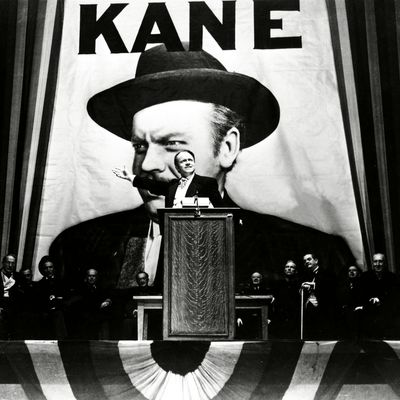
Every week for the foreseeable future, Vulture will be selecting one film to watch as part of our Friday Night Movie Club. This week’s selection comes from Vulture and New York Magazine columnist Mark Harris, who will begin his screening of Citizen Kane on November 13 at 7 p.m. ET. Head to Vulture’s Twitter to catch his live commentary, and look ahead to next week’s movie here.
On December 4, David Fincher’s Mank — a drama about screenwriter Herman J. Mankiewicz (Gary Oldman) and his work writing the 1941 Orson Welles masterpiece Citizen Kane — will arrive on Netflix. That leaves about three weeks for some of you to do the most pleasurable homework imaginable. Do you need to see Citizen Kane to enjoy Mank? No, you don’t — you need to see Citizen Kane, period. Why? Because you love movies, and it’s a foundational, Film Appreciation 101 text, and a major battlefield in a decades-long ongoing discussion of/quarrel about the auteur theory, and also because it’s not only great, but fun. And yes, it will help you appreciate Mank by reducing your need to interrupt the movie by Googling information — though doing so afterward will send you down some excellent rabbit holes. It is totally possible to enjoy Mank without seeing Citizen Kane, just as it is possible to enjoy The Disaster Artist if you’ve never watched The Room or Dreamgirls if you don’t know about the Supremes. But you’ll enjoy Mank more if you see Kane first.
In that spirit, this Friday’s Vulture Movie Club will be devoted to a watchalong of Citizen Kane during which I will provide background on the movie, bits of my recent interview with David Fincher, random trivia and weird digressions, all of which will help you enjoy the movie exactly as Orson Welles intended you to 79 years ago — at home, with one eye on your TV screen and the other idly doomscrolling Twitter. If you’ve seen it before, you already know that it’s a movie that rewards endless rewatching and divulges new details about itself with each revisitation. But I’m hoping that some first-timers will come along, and to them, I’d like to offer the following three advance tips.
1) You don’t need to know very much going in. Don’t panic! It’s a movie, not an A.P. exam. But here’s one thing it helps to be aware of: In 1941, most moviegoers seeing Kane would have known that Charles Foster Kane, the publishing magnate played at every stage of his adult life by the then 24-year-old Welles, was based in large part on the wealthy and tyrannical William Randolph Hearst, who was then still alive (mild spoiler: Kane dies in the movie’s first minutes) and furious about the film. Who was Hearst? The TL;DR version: He was Rupert Murdoch, but American, and before TV, and just as scary, and he worked hard and unsuccessfully to prevent the film’s release.
2) It’s funny. In 1971, Pauline Kael wrote a book-length historical essay published in two issues of The New Yorker called “Raising Kane” in which she argued strenuously that Herman Mankiewicz was, despite sharing credit with Welles, in every meaningful way the sole author of Citizen Kane. Parts, though by no means all, of her essay have since been refuted, but it contains many fascinating and valuable insights, among them the fact that the movie is, in many ways, a comedy — only a dozen years into the sound era, it has impish fun with all kinds of things that had already become conventions and clichés, from the stentorian narration and melodramatic cutting of newsreels to the stale-even-then tropes of great-man biopics, treating them as things to play with, upend, subvert. Because “The Greatest American Film Ever Made” has been stapled to it for so long, it’s easy to forget that it’s okay to laugh. In many ways, it’s even the point.
3) Don’t get too hung up on “Rosebud.” If you’ve never seen Citizen Kane, the one thing you might know about it is that line — the single word that Kane, on his deathbed, enigmatically murmurs just before he drops the snow globe, the shattering of which (in one of the movie’s many game-changing shots) conveys his death. “Rosebud” (and its connection to the globe) sets up Kane as a mystery, but again, it’s a joke, folks — although you do get an answer of sorts at the end, Welles and Mankiewicz are mostly just playing with the idea that a human life can be decoded by a single, simple psychological explanation. The worst way to approach Citizen Kane is as a kind of puzzle to be solved. Actually, no, that’s the second worst way — the worst way is to sit there every minute waiting for it to prove to you that it is the GOAT, an impossible burden for any movie. Just enjoy it! It’s great.
See you Friday.
Citizen Kane is available to stream on HBO Max and to rent on Prime Video, iTunes, Vudu, YouTube, and Google Play.
More From This Series
- Mr. and Mrs. Smith Is a Straight Shot of Movie Star Charisma
- The Timeless Honesty of Wild Style, the First Hip-Hop Movie
- Scott Speedman Answers All Our Questions About Underworld




